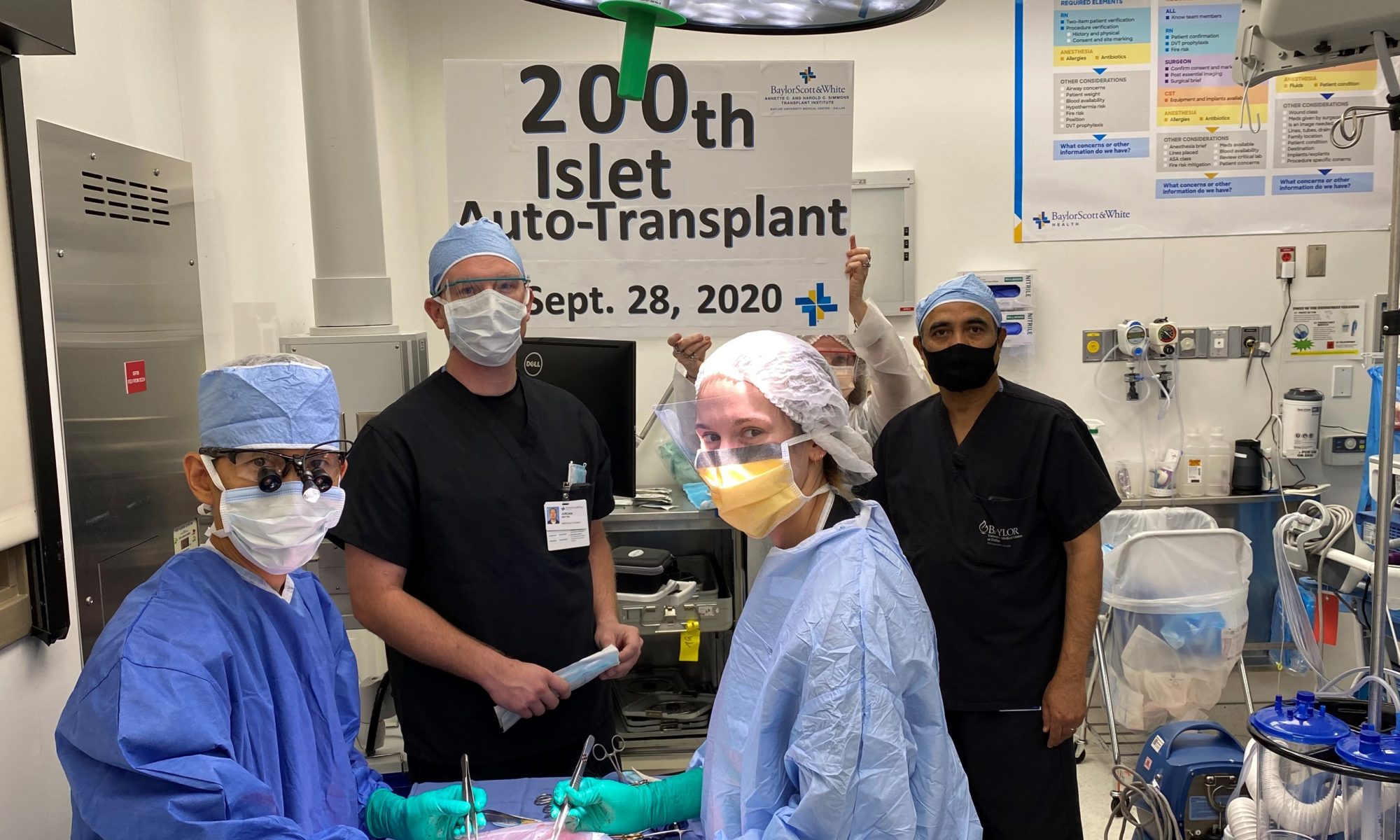Baylor University Medical Center at Dallas, part of Baylor Scott & White Health, recently performed its 200th islet cell transplant in a patient with chronic pancreatitis, making Baylor Dallas one of the four largest islet cell transplant programs in the nation in terms of volume. Baylor Dallas is the only hospital in North Texas that performs these transplants.
The patient, David Wright, an optometrist in West Texas, experienced debilitating pain from chronic pancreatitis for approximately 10 years. Medication would sometimes reduce the attacks. Pain blocks administered by an advanced endoscopist on the medical staff at Baylor Dallas worked for a while too. But the pain escalated over time to the point that Dr. Wright decided to pursue a total pancreatectomy with islet autotransplantation.
“Patients are severely debilitated by the time they get to us, with constant pain and an inability to eat leading to protein and caloric malnutrition,” says Ernest Beecherl, MD, FACS, Assistant Director, Islet Cell transplant, at Baylor University Medical Center. “Chronic pancreatitis can progress slowly or quickly, but it causes a steady decline in the quality of life often to the point the patient can’t maintain employment or attend school. Most patients are on daily anti-emetics and high doses of narcotics to try to control the excruciating pain and nausea. Another indicator of a poor quality of life is multiple ER and hospital admissions per year.”
In the total pancreatectomy with islet autotransplantation procedure, the pancreas is surgically removed and taken to the laboratory where the patient’s own islet cells are extracted. The isolated islet cells are then infused into the patient’s liver through the portal vein, where they engraft and ideally begin to produce insulin again on their own. This may allow the patient to become less dependent on insulin or not dependent on insulin at all, thus avoiding the diagnosis of brittle diabetes. Importantly, the patient is relieved of much or all of the pain they had experienced.
Baylor Dallas performed its first islet cell transplant Oct. 11, 2006. The 100th milestone was reached Nov. 4, 2014. Over the years, the islet cell transplant process has evolved and continues to evolve, Dr. Beecherl says. Patient selection has changed over the last four to five years. Currently, the procedure is performed more in patients with hereditary chronic pancreatitis than those with alcoholic chronic pancreatitis.
“We also are looking at novel places to infuse the islet cells instead of the liver,” Dr. Beecherl says. “Scientists in the Islet Cell Laboratory at Baylor Dallas using a mouse model are putting islet cells in the preperitoneal space and getting superior engraftment results. During the isolation process, we always have excess islets that we used to discard because there is only so much tissue you can put in the portal vein before there is a risk of thrombosis. We are now placing excess islets in the preperitoneal space instead of discarding them.”
“Our long-term goal is to put the islet cells exclusively in the preperitoneal space,” Dr. Beecherl continues. “When we infuse the islets into the portal vein, we have to anticoagulate the patient which can cause post-op bleeding – a serious complication of the procedure. This new approach would greatly improve the safety of the procedure and, hopefully, improve glycemic control compared to the portal vein engraftment.”
Dr. Beecherl says Baylor Dallas’ glycemic control outcomes are excellent with one third of patients being insulin free at one year; another third require some supplemental insulin, while the remaining one third of patients are diabetics similar to a type 2 diabetic requiring long-acting insulin and regular blood sugar checks.
“The goals of the total pancreatectomy with islet autotransplantation are to get patients back to full function, including school or employment, pain free, narcotic free and, hopefully, insulin free,” he says. “For a 20-year-old with chronic pancreatitis, this transplant gives them five or six decades or more to live pain free. That’s a lot of years that we’ve improved the quality of life. It’s very satisfying to be able to return a completely debilitated person back to society as a productive member.”






